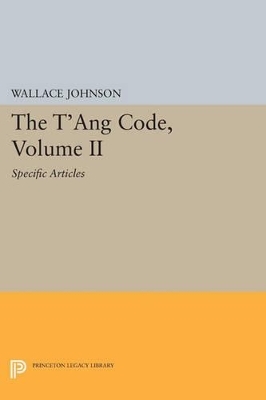
The T'ang Code, Volume II
Princeton University Press (Verlag)
978-0-691-60780-1 (ISBN)
As Western relations with the countries of East Asia continue to expand today, it is increasingly important that we understand the complexities of a legal system that has evolved over more than fifteen centuries. The availability of the complete T'ang Code in English is a significant contribution to this understanding. Originally published in 1997. The Princeton Legacy Library uses the latest print-on-demand technology to again make available previously out-of-print books from the distinguished backlist of Princeton University Press. These editions preserve the original texts of these important books while presenting them in durable paperback and hardcover editions. The goal of the Princeton Legacy Library is to vastly increase access to the rich scholarly heritage found in the thousands of books published by Princeton University Press since its founding in 1905.
Preface Addenda et Corrigenda for Volume I Introduction to the Specific Articles PART THREE The T'ang Code: Specific Articles, Chapters 2. THE IMPERIAL GUARD AND PROHIBITIONS Chapter VII 58. Unauthorized Entry of the Gates of the Imperial Ancestral Temple 59. Unauthorized Entry of the Gates of the Imperial Palace 60. Unauthorized Entry Means Passing over the Threshold 61. Those Who Are Not on the Name Registers at the Gates of the Imperial Palace or an Imperial Audience Hall 62. Improper Substitution of Imperial Guardsmen 63. Entering the Imperial Palace Because of Some Matter and Improperly Staying There Overnight 64. Those Who Enter the Imperial Palace or an Imperial Audience Hall without Signing the Name Register 65. Those Who Do Not Leave the Imperial Palace or an Imperial Audience Hall after Their Work There Is Finished 66. Climbing Up to a High Place and Looking into the Imperial Palace 67. Imperial Guardsmen Who Are Accused in a Memorial to the Throne 68. Those Who Are Required To Leave the Imperial Palace or an Imperial Audience Hall and Who Improperly Delay 69. Unauthorized Entry into Places Where the Emperor Is Not Present 70. Changing the Assignment of Honor Guardmen Which Has Already Been Made 71. Reception of an Imperial Edict To Open the Gates of the Imperial Palace or an Imperial Audience Hall at Night 72. Entering or Leaving the Imperial Palace or an Imperial Audience Hall at Night Is Forbidden 73. Shooting Arrows in the Direction of the Imperial Palace or an Imperial Audience Hall 74. Interference with the Imperial Cortege 75. Imperial Guardsmen Who Do Not Come To Serve Their Turn of Duty Chapter VIII 76. Imperial Guardsmen's Weapons 77. The Gates of Camps in Which the Emperor Is Staying while Traveling 78. Night Patrols inside or outside the Imperial Palace 79. Punishment for Offenses Involving the Imperial Ancestral Temple, the Altar of the Soil, and the Imperial Gardens 80. Standing Guard under a False Name at Such Gates as Those of the Imperial Palace 81. Climbing over the Outer Walls or Walls inside Such Places as Prefecture Cities, Garrisons, and Outposts 82. Illegally Passing through a Customs Barrier 83. Those Who Should Not Be Allowed To Pass through a Customs Barrier 84. Causing Delays and Difficulties at a Customs Barrier or a Ford 85. Those Illegally Passing through a Customs Barrier Who Are Guilty of Other Crimes 86. Wrongly Allowing Civilians or Soldiers To Pass through a Customs Barrier 87. Illegally Taking Prohibited Articles through a Customs Barrier 88. Going around a Frontier Customs Barrier 89. Frontier Walled Outposts 90. Those in Charge of Beacon Fires Not Giving the Alarm 3. ADMINISTRATIVE REGULATIONS Chapter IX 91. The Number of Personnel in Government Offices 92. Recommending Unworthy Persons to the Examination for the Doctorate 93. Prefects and County Magistrates Who Illegally Leave Their Areas of Jurisdiction 94. Officials Who Are Required To Be on Duty but Are Not 95. Officials Who Do Not Come To Take Their Turn at Duty without a Reason 96. Time Limits on Moving To Take Office 97. Officials Who Do Not Follow the Time Schedule in Accompanying the Emperor 98. Failure To Give Advance Announcement of a Great Sacrifice 99. Offering Condolences during Partial Abstinence for a Great Sacrifice 100. Participation in Sacrifices or in Ceremonies at the Imperial Tombs 101. Participation in Court Celebrations during a Period of Mourning 102. Preparation of Medicine for the Emperor 103. Violation of the Dietary Proscriptions in Preparing the Emperor's Food 104. Imperial Boats 105. Imperial Clothing and Other Articles 106. Officials in Charge Who Borrow Imperial Clothing or Other Articles 107. Offenses Committed by Inspecting Officials and Those in Charge of the Emperor's Food 108. Food Presented to Officials 109. Divulging Important Matters 110. Astronomical Instruments 111. Delay in the Copying of Imperial Decrees 112. Violation in Carrying Out an Imperial Decree 113. Forgetting or Misunderstanding in Connection with Imperial Decrees Chapter X 114. Improper Correction of Errors in Imperial Decrees 115. Violating Name Taboos in Documents or Memorials on Affairs Submitted to the Emperor 116. Making Errors in Documents or Memorials on Affairs Submitted to the Emperor 117. Not Memorializing Matters That Ought To Be Memorialized 118. Substitution of Signatures Giving Authorization of Administration or Endorsement on a Government Document When the Language Is Correct 119. Not Returning after Being Sent on a Mission with an Imperial Decree 120. Concealing and Not Mourning the Deaths of Parents or Husband 121. Violating Name Taboos in Administrative Designations and Official Titles 122. Criticizing the Emperor 123. Postal Relay Couriers Who Fall behind Schedule 124. Postal Relay Couriers Who Turn Over Official Documents to Others 125. Documents That Are Required To Be Sent by the Postal Relay Service 126. Postal Relay Couriers Who Do Not Follow the Address 127. Taking an Excessive Number of Post Horses 128. Taking the Wrong Route while Riding Post Horses 129. Carrying Private Articles while Riding Post Horses 130. Offenses Committed by Senior Officials and Commissioners 131. Completion of Matters in Which Tallies and Ensigns Have Been Used 132. Delay in Carrying Out Official Matters Chapter XI 133. Being Assigned a Mission and Hiring or Sending Other Persons To Carry It Out 134. Officials Who Improperly Set Up Stone Monuments 135. Those Who Seek Favors 136. Officials Who Take Bribes for Favors Sought 137. Persons Who Offer Bribes in Seeking To Have a Matter Favorably Carried Out 138. Supervisory and Custodial Officials Who Take Bribes and Subvert the Law 139. Officials Who Do Not Take Bribes Beforehand 140. Officials Who Take Goods and Articles within Their Area of Jurisdiction 141. Officials Who Receive Presents because of Being a Commissioner 142. Officials Who Borrow Goods and Articles within Their Area of Jurisdiction 143. Officials Who Make Use of Labor within Their Area of Jurisdiction 144. Officials Who Receive Presents from Persons within Their Area of Jurisdiction 145. Officials Who Exact Goods and Articles from Persons within Their Area of Jurisdiction 146. Extortion by the Family Members of Officials 147. Officials Who after Leaving Office Receive Presents from Their Former Subordinates 148. Using Power and Extortion 149. References to the Code, the Statutes, and the Ordinances 4. THE HOUSEHOLD AND MARRIAGE Chapter XII 150. Omitting a Household from the Household Register 151. Village Headmen Who Are Not Aware That a Household Has Been Omitted from the Household Register or That Household Members Have Been Left Off of It 152. Prefects and Magistrates Who Are Not Aware That a Household Has Been Omitted from the Household Register or That Household Members Have Been Left Off of It 153. Village Headmen or Officials Who Wrongly Omit a Household from the House
| Erscheint lt. Verlag | 14.7.2014 |
|---|---|
| Reihe/Serie | Princeton Library of Asian Translations |
| Übersetzer | Wallace Johnson |
| Verlagsort | New Jersey |
| Sprache | englisch |
| Maße | 152 x 229 mm |
| Gewicht | 851 g |
| Themenwelt | Geisteswissenschaften ► Geschichte ► Regional- / Ländergeschichte |
| Geschichte ► Teilgebiete der Geschichte ► Militärgeschichte | |
| Recht / Steuern ► EU / Internationales Recht | |
| Recht / Steuern ► Rechtsgeschichte | |
| ISBN-10 | 0-691-60780-X / 069160780X |
| ISBN-13 | 978-0-691-60780-1 / 9780691607801 |
| Zustand | Neuware |
| Haben Sie eine Frage zum Produkt? |
aus dem Bereich


